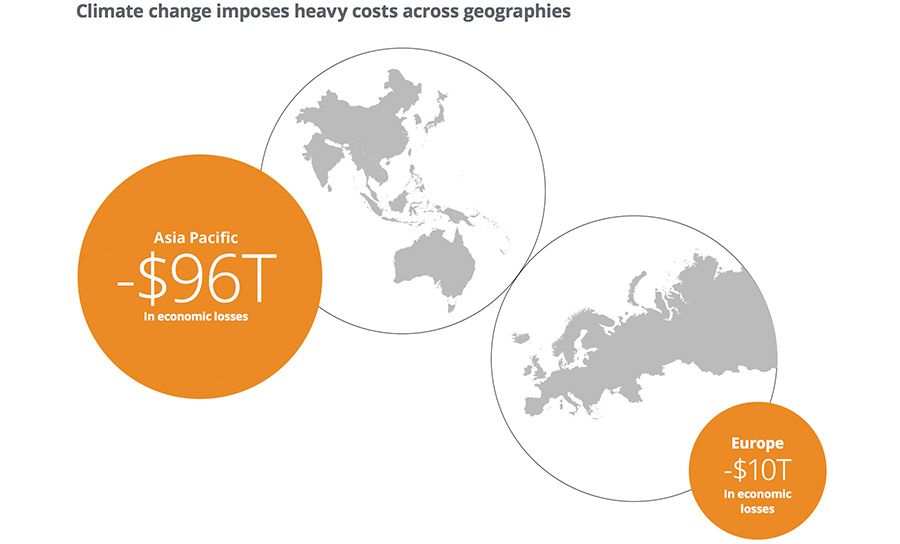Should world leaders find a way to collaborate and oversee a systemic transition to a decarbonised economy, the global economy could enjoy five-decade gains of more than $40 trillion. However, if they remain on their present course, the global economy could be on track to lose four-times that amount.
A new report from the Deloitte Center for Sustainable Progress (DCSP) has found that if left unchecked, climate change could cost the global economy $178 trillion over the next 50 years, or a 7.6% cut to global gross domestic product (GDP) in the year 2070 alone. Deloitte’s Global Turning Point Report is based on research conducted by the Deloitte Economics Institute. The report analysed 15 geographies in Asia Pacific, Europe, and the Americas.
It found that if global warming reaches around 3C toward the century’s end, the toll on human lives could be significant – disproportionately impacting the most vulnerable and leading to loss of productivity and employment, food and water scarcity, worsening health and well-being, and ushering in an overall lower standard of living globally. The impact would be worst felt in Asia Pacific, where economic losses of $96 trillion could cause a deepening crisis, and dramatically destablise the region. Even though Europe and the Americas might see a ‘smaller’ impact by comparison, the knock-on effects would similarly lead to their economies shrinking drastically.

“It’s important that the global economy evolves to meet the challenges of climate change,” said Dr. Pradeep Philip, Deloitte Economics Institute. “Our analysis shows that a low-carbon future is not only a societal imperative but an economic one. We already have the technologies, business models, and policy approaches to simultaneously combat the climate crisis and unlock significant economic growth, but we need governments, businesses, and communities globally to align on a pathway toward a net-zero future.”
Whenever radical economic change is recommended, certain factions of society immediately demand explanations of “how do we pay for that?” But according to Deloitte, the shift to net zero will come with a remarkable benefit for the global economy. Investments in decarbonisation will create temporary losses – but only until a certain tipping point.
Before 2050, Deloitte expects a turning point, where the investments will begin to spur major gains. The researchers found in that case that if global leaders unite in a systemic net-zero transition, the global economy could see new five-decade gains of $43 trillion – a boost to global GDP of 3.8% in 2070.

Europe can capitalise on a relatively low-cost transition to reap the benefits of becoming the world’s first carbon-neutral region. With a turning point in the 2050s, decarbonisation would increase regional GDP by 1.8% in 2070 compared to the 3C baseline, a benefit that would continue expanding in subsequent years. At the same time, the Americas can benefit to a similar degree.
Relative to the 3C warming pathway, decarbonisation across the Americas could boost GDP by 1.8% in the year 2070 alone, with a turning point in the 2060s. While the US remains slow to decarbonise – with its fossil fuels lobby contributing to a political deadlock that it has so far been unable to convincingly overcome – those concerned with the economics of the net zero transition may be preventing a significant economic boom. As the largest economy in the region, the US is expected to reap $885 billion of the benefit in the Americas – a single dividend which exceeds the current combined annual revenues of Amazon, Alphabet and Microsoft.
Asia Pacific could see the largest benefit, as they will likely see a turning point soonest. With the tipping point coming in the present decade, by 2070, the region’s economy could be enjoy an economic benefit of $9 trillion, relative to the 3C warming path. Deloitte notes that this is approximately the equivalent value of adding Japan’s, Australia’s and India’s economy to the region in 2070 alone. And while Deloitte’s model did not have specific predictions for Africa, the Middle East and Rest of the World, it predicted that the macroeconomics of making a new industrial revolution to hit net zero would be the same.




